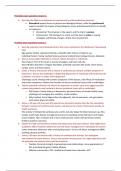Potential exam questions lecture 1:
A. Describe the differences between the psychosocial and biomedical perspectives:
a. Biomedical aspects focus on physical and biological factors, while the psychosocial
aspects consider the impact of psychological, social, and behavioral factors on health.
o In treatment:
▪ Biomedical: The physician is the expert, and the client is passive.
▪ Psychosocial: The therapist is a coach, and the client is active in coping
strategies and lifestyle changes. Active client involvement
Possible exam questions lecture 2:
1. Describe potential risk (individual) factors that may contribute to the likelihood of developing
CAD.
Age, gender (male), sedentary lifestyle, unhealthy diet, history of tobacco use.
Individual factors: Family medical history, personal medical history (hypertension, diabetes)
2. Discuss the possible implications of heart rhythm disorders in individuals.
Heart failure: Part of the heart is starved of oxygen, and heart cells die
Heart Rhythm Disorders: Irregular heartbeat, potential outcomes like stroke, heart failure,
cardiac arrest, and heart attack.
3. Sarah, a 45-year-old woman with a history of cardiovascular disease, exhibits symptoms of
depression. Discuss the challenges in diagnosing depression in individuals with cardiovascular
conditions, and why it is often under-diagnosed.
Challenges could: Overlap with somatic symptoms of the disease, side effects of medication
may mimic symptoms. Patients feel hesitant to discuss emotional issues with a cardiologist.
4. Explore potential individual risk factors for depression in Sarah's case, and suggest possible
reasons why patients may hesitate to discuss emotional issues with a cardiologist.
o Risk factors: Family history of depression, personal history of mental health issues,
challenges of managing the condition, social isolation.
o Why hesitant: Social stigma (fear of judgment), lack of awareness, role perception
(only about physical health).
5. James, a 50-year-old man post-MI, experiences persistent anxiety. Describe the association
between anxiety and cardiovascular events, and discuss the impact of persistent anxiety on
health outcomes.
The anxiety is followed by cardiovascular events, but also keeps the blood pressure up. Also,
anxiety could make disease management poorer, by avoiding certain behaviors and maybe
social isolation. Aka: Increased risk of new cardiovascular events with persistent anxiety
linked to adverse outcomes.
6. Explain the high comorbidity of anxiety with depression and psych distress. How might these
conditions affect treatment adherence and risk factor management in individuals like James?
Lower treatment adherence when anxiety/depression. So less risk factor management (BMI,
smoking, physical activity).
7. Emma, a 60-year-old woman with a history of cardiovascular disease, has undergone
interventions for psych distress. Discuss the positive consequences she might experience and
list potential interventions that could be beneficial.
o Positive: Personal strength, improved personal relationships, more appreciation of
life, prioritized life goals, healthy lifestyle.
o Effective intervention: CBT, mindfulness-based stress reduction, ACT.





